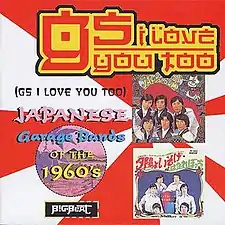GS I Love You Too: Japanese Garage Bands of the 1960s
GS I Love You Too: Japanese Garage Bands of the 1960s is the second installment in the GS I Love You CD compilation series, featuring songs from the Group sounds (or GS) movement in Japan during the 1960s (the first CD being GS I Love You).[1] GS was essentially the Japanese variant of garage and psychedelic rock.[2][3] Japan, like many Western countries, experienced a beat boom in the 1960s as a result of the British Invasion, particularly in the wake of the Beatles' 1966 visit to the country.[2][4][5] Though the Japanese beat craze blossomed slightly later than in the West, it stretched well into the end of the decade, with groups continuing to play in the beat/garage style after it had fallen out of favor elsewhere.[2][6] Surf rock, which had been popular in Japan since before the arrival of the Beatles continued to exert influence on the music throughout the decade.[2][5] Bands typically sang in both Japanese and English.[2] GS I Love You Too was issued in 1999 by Big Beat Records.[3] Like the first entry in the series, it is noted for good mastering and high sound quality.[2] The front cover sleeve of the CD is adorned with a backdrop of bright red sun rays invoking the pre-WWII (pre-surrender) Japanese imperial flag, and the inside includes English liner notes that provide biographical information about the groups and their songs.[2][3]
| GS I Love You Too: Japanese Garage Bands of the 1960s | ||||
|---|---|---|---|---|
 | ||||
| Compilation album | ||||
| Released | November 9, 1999 | |||
| Recorded | 1960s | |||
| Genre | ||||
| Length | 1:17:44 | |||
| Label | Big Beat | |||
| chronology | ||||
| ||||
The set commences with "Hanashitakunai" by the Youngers, who re-appear with other up-tempoed, fuzz-laced confections such as "Zin Zin Zin", "My Love, My Love" and "Do the Whip The Carnabeats' frantic British Invasion-inspired sound is featured on several cuts such "Chu Chu Chu", "Sutekina Sandy", "Give Me Lovin'", and "Love Only You".[3] The Tempters are more stylistically and rhythmically diverse as evidenced in "Himitsu No Haikutoba", "Kono Mune Ni Dakishimete", "Bokutachi Tenshi", and "Kamisama Onegai".[3] The Jaguars start with "Dancing Lonely Night" but then venture into the album's most intense flight into psychedelia with "Seaside Bound", then return with "Stop the Music", and "Beat Train".[3] The Savage provide a surf rock instrumental in "Space Express". Lind & the Linders manage to combine 60s garage raunch with pop polish in "Koi Ni Shiberete".[3]
Track listing
- The Youngers: "Hanashitakunai" 2:41
- The Jaguars: "Dancing Lonely Night" (Kunihiko Suzuki) 3:01
- The Carnabeats: "Chu Chu Chu" 2:50
- The D'Swooners: "Please Please Trina" (Ronnie Parina) 2:05
- The Tempters: "Himitsu No Haikutoba" (Yoshiharu Matuzaki) 2:53
- The Carnabeats: "Sutekina Sandy" (Ai Takano) 2:37
- The Youngers: "Zin Zin Zin" 3:00
- The Tempters: "Tell Me More" 3:44
- The Jaguars: Seaside Bound 3:10
- The D'Swooners: "Stone Free" (Jimi Hendrix) 5:24
- The Savage: "Space Express" 2:23
- Lind & The Linders: "Koi Ni Shiberete" 3:04
- The Tempters: "Kidotta Ano Ko" (Yoshiharu Matuzaki) 2:48
- The Carnabeats: "Give Me Lovin'" (Bill Schnare) 2:49
- The Jaguars: "Dancin' Baby" (Hisayuki Okitsu) 2:44
- The Tempters: "Stop the Music" (Milton Subotsky/Clive Westlake) 3:02
- The Youngers: "My Love, My Love" 2:47
- The Tempters: "Kono Mune Ni Dakishimete" (Yoshiharu Matuzaki) 2:11
- The Carnabeats: "Love Only for You" 3:14
- Lind & the Linders: "Yuhi Yo Isoge" (Hiroshi Kato) 2:56
- The Jaguars: "Beat Train" (Yukio Miya) 2:55
- The Tempters: "Bokutachi No Tenshi" (Yoshiharu Matuzaki) 3:10
- The Youngers: "Do the Whip" (Jesse James) 2:24
- The Jaguars: "Taiyoh Yaroh" (Tokiko Iwatani) 2:00
- The Carnabeats: "Kanashami No Bell" 2:49
- The Tempters: "Wasure Emu Kimi" (Yoshiharu Matuzaki) 2:52
- The Tempters: "Kamisama Onegai" (Yoshiharu Matuzaki) 2:11
References
- "Various – GS I Love You Too (Japanese Garage Bands Of The 1960s)". Discogs. Discogs®. Retrieved May 14, 2016.
- Unterberger, Richie. "GS I Love You: Japanese Garage Bands of the '60s (Review)". AllMusic. AllMusic, a division of All Media Network, LLC. Retrieved May 11, 2016.
- Unterberger, Richie. "GS I Love You Too: Japanese Garage Bands of the '60s [Vol. 2]". AllMusic. AllMusic, a division of All Media Network, LLC. Retrieved July 30, 2015.
- "1960s Japanese Group Sounds". The Video Beat!. The Video Beat!.com. Retrieved May 11, 2016.
- n/a, MessyNessy. "The Groovy Imitation Bands of 1960s Japanese Rock". MessyNessy Chic. MessyNessy Chic.com. Retrieved May 11, 2016.
- "Japanese Group Sounds". WFMU's Beware of the Blog. WFMU. November 22, 2008. Retrieved May 11, 2016.